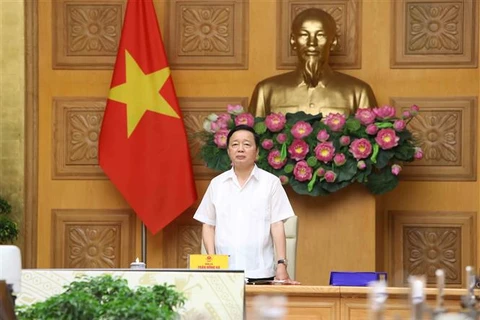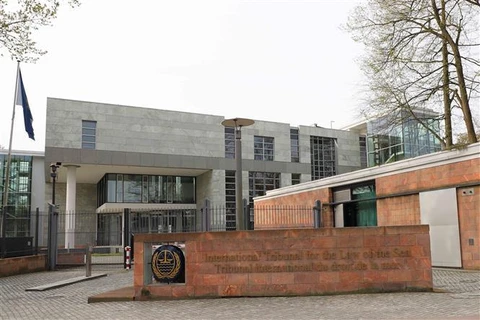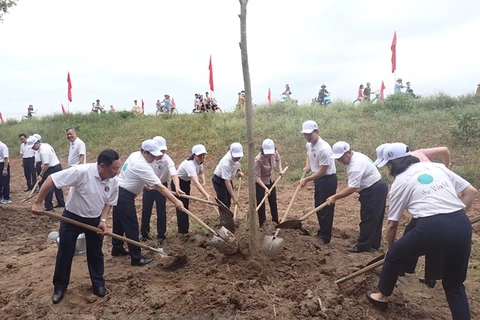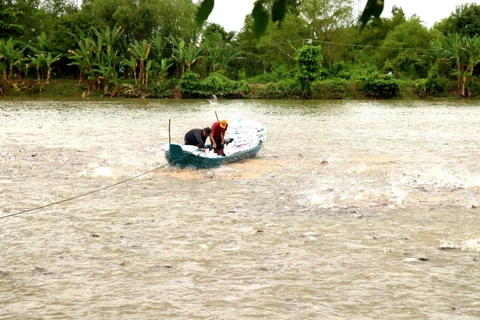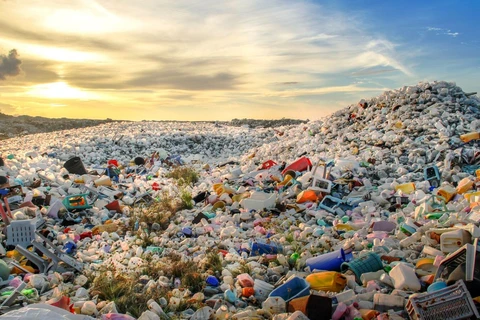 Bac Giang will urge industrial production facilities to install and operate exhaust gas treatment systems. (Illustrative photo: baobacgiang.com.vn)
Bac Giang will urge industrial production facilities to install and operate exhaust gas treatment systems. (Illustrative photo: baobacgiang.com.vn) Bac Giang (VNA) – The northern province of Bac Giang will take more drastic actions from now to 2030 to tackle and reduce air pollution, according to Vice Chairman of the provincial People’s Committee Le O Pich.
Accordingly, Bac Giang will urge industrial production facilities to install and operate exhaust gas treatment systems, and increase inspections to ensure they meet environmental technical regulations, especially at facilities which emit a large source of dust and exhaust gas.
In addition, the locality will strictly control the operations of all production facilities subject to the installation of automatic and continuous dust and industrial emissions monitoring systems, complete the installation and transmit data to the Department of Natural Resources and Environment before January 1, 2025, and halt the operation of establishments that do not comply with regulations.
Inspections and supervisions will be intensified at production and business establishments with high risk of causing environmental pollution and generating large emissions; and unexpected inspections will be conducted when there are signs of violation.
The province will accelerate investment progress to soon put into operation large-scale waste treatment plants which apply modern technology such as Bac Giang city waste-to-energy plant, and concentrated waste treatment plants in Hiep Hoa and Luc Nam districts.
Vice Chairman Pich stated that in the coming time, Bac Giang will not issue new licenses, extend or expand the scale of facilities that are at risk of causing environmental pollution with an emission flow of 100,000 cu.m per hour or more in urban areas, residential areas, and outside industrial parks/clusters; and projects to treat household waste with incinerators whose capacity is less than 5 tonnes per day.
Furthermore, the province will implement a roadmap to relocate production facilities causing environmental pollution in residential areas and urban areas into industrial parks and clusters. Production facilities using old and outdated technology that generate large amounts of dust and emissions will be requested to have a plan to invest in innovating and improving production technology and exhaust gas treatment to ensure exhaust gas comply with technical standards before being released into the environment.
The province is encouraging industrial establishments to use biofuels in production; invest in innovating technology, production processes and production equipment, improve the capacity of governance technology, and apply environmental treatment technologies to prevent and reduce air pollution, he added.
According to the provincial Department of Natural Resources and Environment, air quality in the province has differences between regions and fluctuates seasonally, but is still at a stable level.
Results of periodic environmental monitoring in recent years show that concentrations of suspended dust and PM10 dust have increased in some urban areas of Bac Giang province, especially at main traffic intersections in Bac Giang city and industrial parks and clusters. Air quality in some key industrial zonesm namely Quang Chau, Van Trung, Dinh Tram and Song Khe - Noi Hoang shows signs of increasing pollution.
The province currently has 64 domestic solid waste treatment facilities, including three landfills. There is also an industrial and hazardous solid waste treatment plant in Nham Bien town, Yen Dung district with a capacity of 142,000 tonnes per year./.
